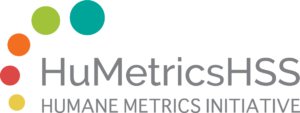As part of the TriangleSCI HuMetrics working group, I spent the better part of this afternoon brainstorming and debating academic values, products, processes, and metrics in an attempt to lay a foundation for this week’s attempt at articulating “humane metrics” for the humanities.
As our discussion wound down, it occurred to the team that we were working with an important assumption re: values: we had spent the day identifying only those “enriching” values that we wanted to encourage (collaboration, generosity, inclusivity, quality, etc.), rather than examining the current set of values we wished to discourage, those that in many ways are “corroding” academia (competition, bureaucracy, exclusivity, etc.).
That’s in large part due to what we’re here in Chapel Hill to do: define and promote a means of appropriately measuring and rewarding quality scholarship (if not excellence) in the humanities — a group of disciplines currently underserved by citation-based metrics.
Yet citation-based metrics are increasingly being requested in research evaluation scenarios, by tenure and review committees, granting agencies, and university administrators who wish to benchmark their departments against those of other universities. And those metrics often unintentionally reinforce so-called “corrosive” values: as Haustein and Larivière point out, the over-reliance upon simplistic, citation-based metrics for evaluation has led to undesired practices in academia like “salami-slicing,” self-citation, and ghost authorship; in the humanities, Nederhof explains that a focus upon both citation-based metrics and a push toward publishing in “preferred” venues has led to changing publication practices that are out of step with the realities of the field.
As our work begins tomorrow, we’ll attempt to explore those values that “enrich” academia, hopefully allowing us to “reverse engineer” or map metrics that measure scholars’ ability to achieve values we wish to encourage. No small feat, for sure.
Follow team #HuMetrics as we wrestle with humanities metrics. We are Christopher Long, Rebecca Kennison, Stacy Konkiel, Simone Sacchi, Jason Rhody, and Nicky Agate, and we’ll be writing here all week.
